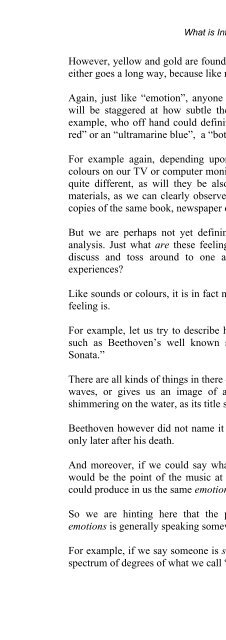07.+What+is+Intelligence+(February+2006) - Get a Free Blog
07.+What+is+Intelligence+(February+2006) - Get a Free Blog
07.+What+is+Intelligence+(February+2006) - Get a Free Blog
You also want an ePaper? Increase the reach of your titles
YUMPU automatically turns print PDFs into web optimized ePapers that Google loves.
What is Intelligence? 38<br />
However, yellow and gold are found in Nature in short supply. A little of<br />
either goes a long way, because like red they are such powerful colours.<br />
Again, just like “emotion”, anyone who has ever tried matching paints<br />
will be staggered at how subtle the variations of colour can be – for<br />
example, who off hand could definitely identify what was a “vermillion<br />
red” or an “ultramarine blue”, a “bottle green” or a “pearl white”?<br />
For example again, depending upon the settings of the red/green/blue<br />
colours on our TV or computer monitor, those named colours will appear<br />
quite different, as will they be also on the varieties of printed colour<br />
materials, as we can clearly observe for example by looking at different<br />
copies of the same book, newspaper or magazine.<br />
But we are perhaps not yet defining our terms clearly enough in this<br />
analysis. Just what are these feelings, and emotions which we so freely<br />
discuss and toss around to one another in describing our everyday<br />
experiences?<br />
Like sounds or colours, it is in fact not so easy to say what any particular<br />
feeling is.<br />
For example, let us try to describe how a piece of music makes us feel,<br />
such as Beethoven’s well known slow movement of the “Moonlight<br />
Sonata.”<br />
There are all kinds of things in there – we can say, it is like the lapping of<br />
waves, or gives us an image of a lake at night with the moonlight<br />
shimmering on the water, as its title suggests.<br />
Beethoven however did not name it so. This popular title was tagged on<br />
only later after his death.<br />
And moreover, if we could say what it meant precisely in words, what<br />
would be the point of the music at all, why would we need it if words<br />
could produce in us the same emotion, the same meaning?<br />
So we are hinting here that the power of words in expressing our<br />
emotions is generally speaking somewhat vague and limited.<br />
For example, if we say someone is sad, that could in itself mean a whole<br />
spectrum of degrees of what we call “sadness.”


